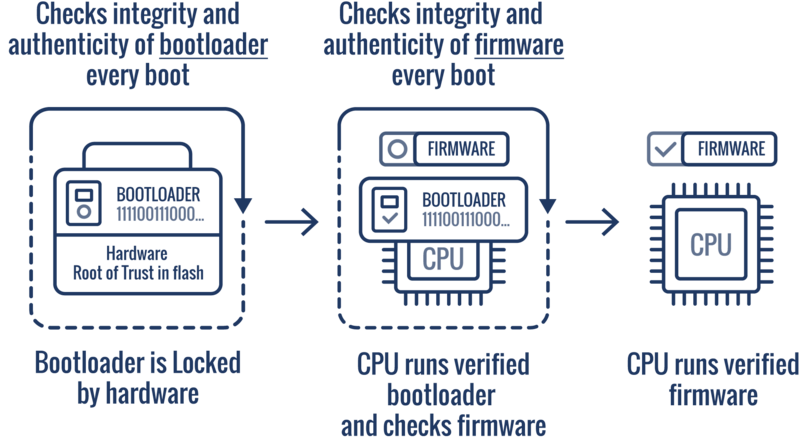Secure Boot: Difference between revisions
No edit summary |
No edit summary |
||
| Line 3: | Line 3: | ||
A secure boot system adds cryptographic checks to each stage of the system boot process. Cryptographic processing verifies the authenticity of all of the protected software images that are executed by the devices. Routers with a secure boot protection mechanism allows loading firmware released only by Teltonika | A secure boot system adds cryptographic checks to each stage of the system boot process. Cryptographic processing verifies the authenticity of all of the protected software images that are executed by the devices. Routers with a secure boot protection mechanism allows loading firmware released only by Teltonika | ||
<br> | |||
[[File:How secure boot works v1.png|800px|center]] | |||
==Why you should use secure boot?== | ==Why you should use secure boot?== | ||
| Line 19: | Line 21: | ||
'''* RUT955T073B0''' | '''* RUT955T073B0''' | ||
[[Category:Security]] | [[Category:Security]] | ||
Revision as of 14:00, 3 August 2021
Main Page > FAQ > Security > Secure BootHow secure boot works?
A secure boot system adds cryptographic checks to each stage of the system boot process. Cryptographic processing verifies the authenticity of all of the protected software images that are executed by the devices. Routers with a secure boot protection mechanism allows loading firmware released only by Teltonika

Why you should use secure boot?
This additional check prevents unauthorized images from running on the router. This way, it secures the router from any unwanted "guests" loading malicious software versions.
Limitations
Devices that do have the Secure Boot will not allow uploading modified firmware images based on Teltonika software development kit(SDK)
Compatibility
At this moment secure boot is compatible only with certain RUT950 and RUT955 versions (without any additional configuration):
* RUT950U072C0
* RUT955T073B0
